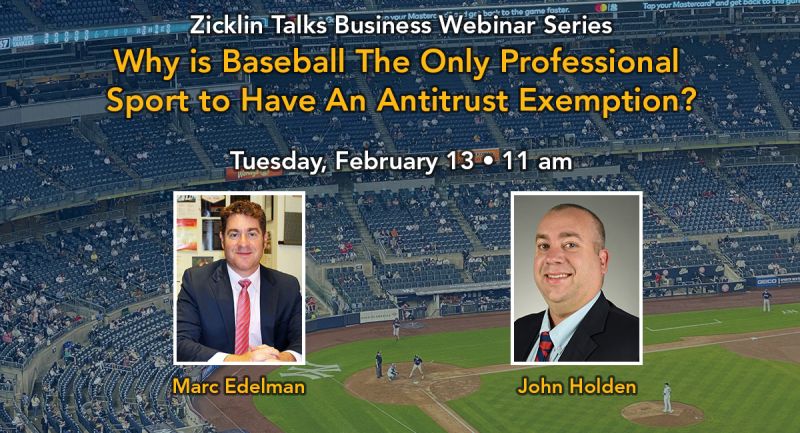Business school namesake Larry Zicklin discusses baseball’s antitrust exemption and its implications for sports leagues and businesses in a webinar on Feb. 13.
Zicklin opened the webinar by acknowledging that baseball is the only sport with an antitrust exemption and asked what the exemption is. John Holden — associate professor in the Spears School of Business at Oklahoma State University — explained that the exemption dates to the outcome of a 1922 Supreme Court case Federal Baseball Club v. National League.
Holden further explained that the Federal League and National League were competitors comprising multiple teams nationwide and when the Federal League “was losing a lot of money” the National League began buying out teams. However, one team in Baltimore did not want a buyout and sued the National League for “engaging in anticompetitive conduct” and did not allow players to sign and play with them, which led to an interpretation of interstate trade and commerce.
“So this case reaches the Supreme Court and what the Supreme Court effectively determines at the time was that baseball is an interstate,” Holden said. “It takes place within a signal state at a time activity, and because it doesn’t cross state lines, it doesn’t implicate Federal antitrust law.”
The Sherman Antitrust Act prohibits restricting competition or interstate commerce — transportation of goods and services across state borders — and needs to be found violated in an antitrust case.
Marc Edelman — professor of law in the Zicklin School of Business at Baruch College — added that the Supreme Court heard two more cases and acknowledged baseball as interstate commerce, but the reserve system of baseball remained exempt because it relies on the main baseball league.
The reserve system is a system that allows teams to own players’ rights, set their salaries and the duration of their contracts.
Zicklin asked what other professional sports think about baseball’s antitrust exemption, to which Holden said, “everyone is very jealous” and noted that the National Football League asked Congress to treat them “the same as baseball.”
Despite the jealousy of other professional sports leagues, Edelman expressed that the exemption does not benefit the sport in signing players anymore because of collective bargaining. However, he acknowledged that it benefits the “product or territory markets” regarding licensing and manufacturing goods.
“Now what Major League Baseball does under the color of their antitrust exemption is they’ve decided to take their rights to certain broadcast rights and all intellectual trade, all intellectual property rights, including trademark, and centralized them at the league level,” Edelman explained to Zicklin. “Through an entity they created, Major League Baseball Properties.”
Edelman added that to make baseball cards with the Mets logo, “you would have to go the league level” instead of the Mets and buy the trademark rights of every team, which gives MLB the ability to charge manufacturers a “higher fee to grant monopolies over these categories.”
When asked if the exemption would exist 10 years into the future, both professors agreed that it would because MLB will continue to “make settlements” on cases before the Supreme Court will hear anything, and Congress will not “be able to reach a consensus.”
In a moderated Q&A session, Zicklin was asked if the discussion had positively or negatively changed his love for baseball, to which he responded it had not.
“It has not affected my love,” Zicklin told the audience. “I will always love baseball among all other sports.”









Anabel • Feb 28, 2024 at 3:24 pm
The article was brilliantly composed and presented a memorable depiction of the webinar. Most inciting was to see how businesses may profit from legal exemptions as baseball does and the disadvantages for businesses that face harsher legal restrictions. Thus, this captures the powerful interplay between legal matters and business commerce. 5/5!